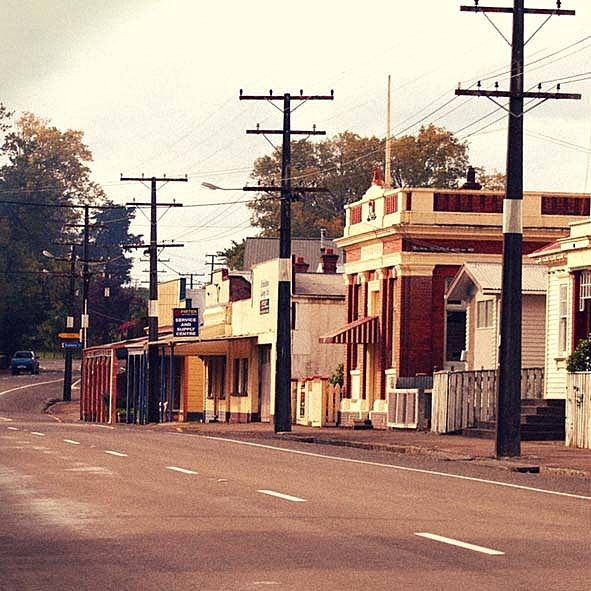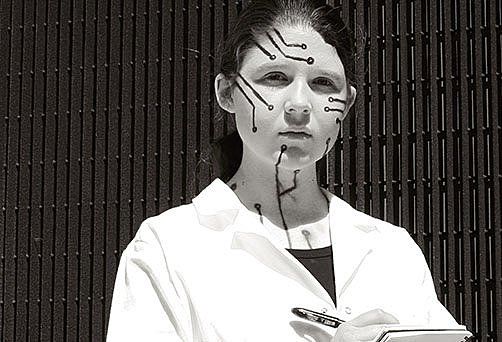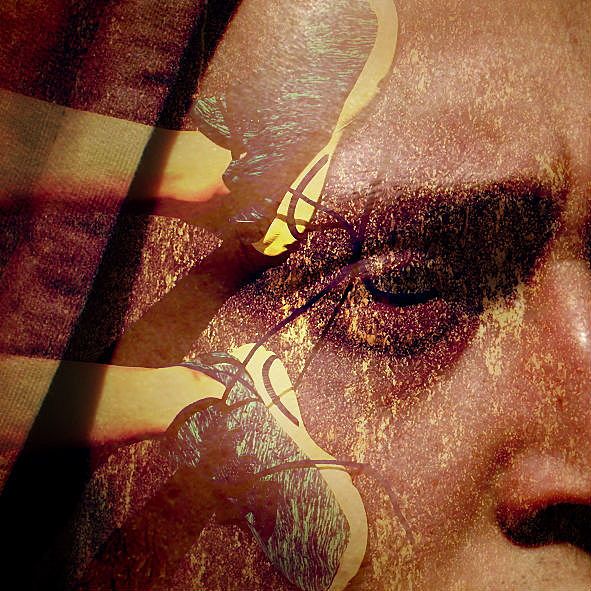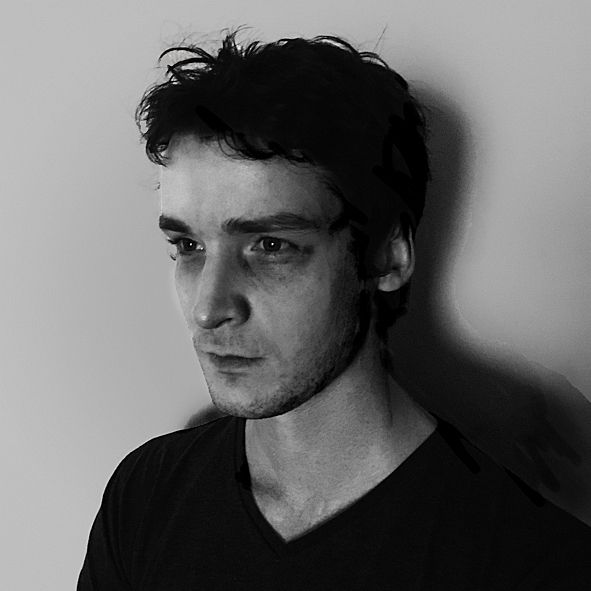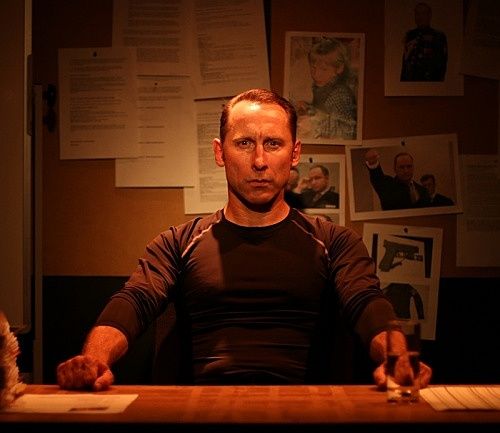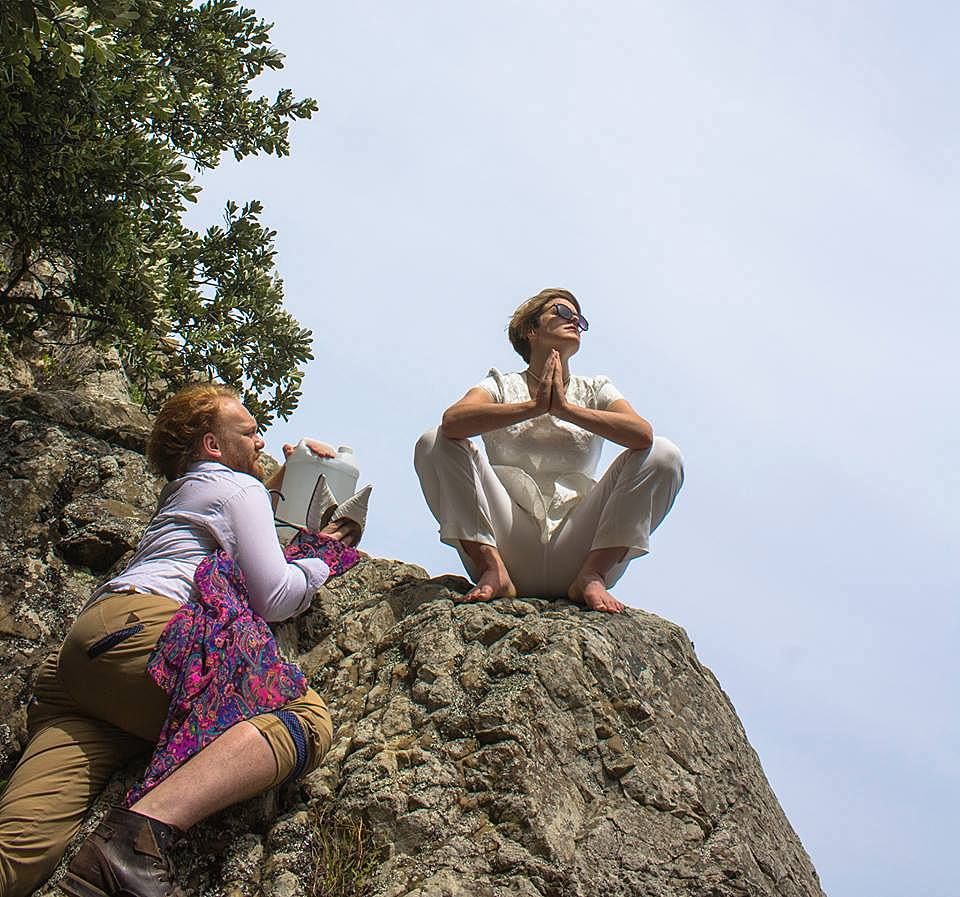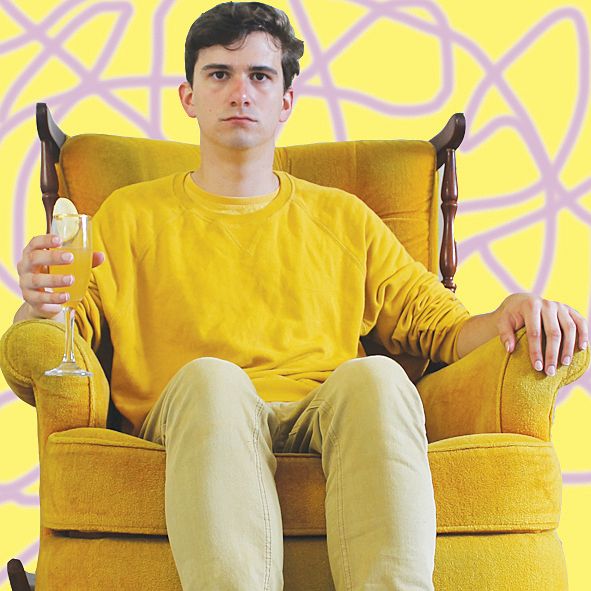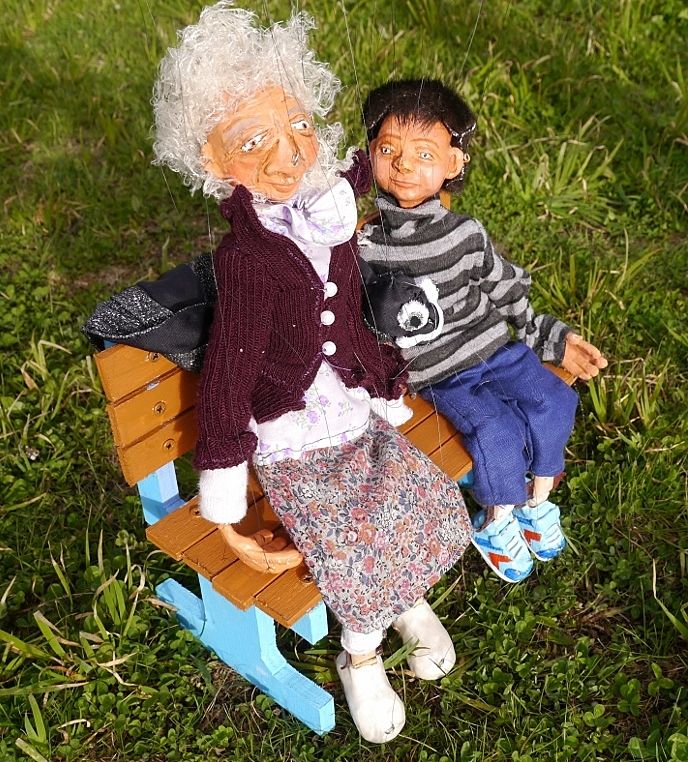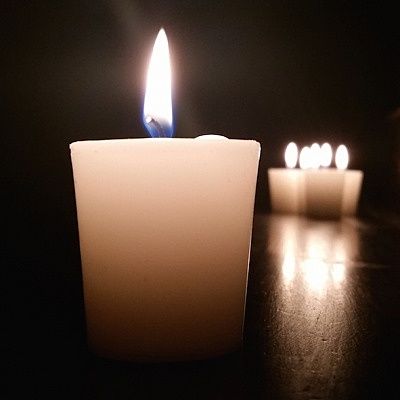The New Zealand Fringe Festival 2017: The First Week
It's New Zealand Fringe Festival season and Pantograph Punch has assembled a crack team of Wellington reviewers to get amongst it, taking in the roar of the greasepaint and the smell of the crowds at theatres across Wellington. How does this Fringe stack up? We start here.
It's New Zealand Fringe Festival season and Pantograph Punch has assembled a crack team of Wellington reviewers to get amongst it, taking in the roar of the greasepaint and the smell of the crowds at theatres across Wellington. How does this Fringe stack up? We start here.
The New Zealand Fringe Festival opens up to audiences on February the 10th. There's a good 120-odd shows in this year's Festival, but our reviewing team is focusing on the theatre (and the shows that blur the line between theatre and, well, everything else). Over the next three weeks, Adam Goodall, Shannon Friday, Matt Loveranes, Fi McNamara and Mia Gaudin will get out to just under 40 of those shows - nearly a third of what's on offer - and serve up bite-sized criticism on the fly. After all, it's Fringe. What would it be without some chaos?
New Zealand Fringe Festival, Week One (Friday 10 to Thursday 16 February): The Shows
Easy Living: Life In A Small Town
Paying For It: An Insider's Guide To The New Zealand Sex Industry
Biased Beyond Belief
Router Sidewalker: Pedestrian Pilgrimage
Bleeding Black
Manifesto 2083
The Rites of Guru Rach
"Ze": Queer As Fuck!
Jacob's Party
Nan and Tuna
Stoge Chollonge 2006
The Basement Tapes
Out of Darkness
Easy Living: Life In A Small Town
Easy Living: Life in a Small Town, the latest offering from PlayShop, plays on the idea that folks in a small town all know each other. The result is charmingly low-key: instead of gut-busting gags, Easy Living feels like a Robert Altman film, full of curious detail and roundabout conversation. Everyone’s very courteous and gentle with each other’s feelings, even the plain-spoken auntie/town gossip, and it’s lovely to watch people work together to understand and solve each other’s problems.
Easy Living’s simple structure encourages attention to detail but flattens out variety. Every scene is a two-hander that introduces a new character. As a result, the improvisers are constantly repeating the same task: asking, “Who are we, and how do we know each other?” When paired with its consistent kindness, Easy Living starts to feel monotonous. The constancy is true to my memories of growing up in a small town, but I can’t help but wish for some variety, for these folks’ lives and relationships to expand in some way. -- SF
Gryphon Theatre, 22 Ghuznee Street, Thursday 16 to Sunday 19 February
For more information on Easy Living, go here.
Paying For It: An Insider's Guide To The New Zealand Sex Industry
Paying for It is an extraordinary event. Five active sex workers recount some of what they have experienced while working in the industry, telling it like it is. It’s raw, brutally honest, often hilarious, sometimes sad and sometimes beautiful.
The overall purpose is clear - to destigmatise sex work and make it something that we can openly talk about and laugh about. Each performer brings their own important message. The first performer declares “I just want people to be educated about sex work and being trans*”; another talks about the reality of sex, sexuality and the search for love for a client with a severe disability; others bravely recount some of the violence they’ve endured in their work.
These messages are important. In our communities, conversations about sex are often held behind closed doors or not at all. Women are shamed for seeking sexual pleasure. Sex work is not valued as real work and sex workers are often treated as less than human. Last year we saw a high profile sports team assault a woman they had hired as a stripper, and in the conversation that followed many tried to argue that abuse just goes with the job.
The stories in Paying for It challenge these attitudes and serve to humanise sex workers; they show us that the work and the industry is complex, and cannot simply be condemned. The performers are brave, bold and generous; after listening to their stories, I’m filled with enormous respect for them as people, as workers, as writers and performers. These are stories that need to be told and need to be heard. -- FM
Fringe Bar, 26-32 Allen Street, Wednesday 15 February
Ivy Bar, 49 Cuba Street, Friday 24 February
For more information on Paying For It, go here.
Biased Beyond Belief
Biased Beyond Belief is lo-fi sci-fi that skimps on the sci, a Black Mirror-esque cultural commentary that fails to fully deliver on its early promise. (They note in the programme that it is a work in progress, though there’s questions to be asked about not disclosing that in the show’s marketing.)
We open on the sci: Maria is programming Earnest, her groundbreaking new Artificial Intelligence. Earnest quickly falls out of the narrative, though, as we clunk our way through the clichés of Maria’s life: relationships, motherhood, sickness, an election campaign in which Maria shouts her politics at the audience, subtlety be damned. The pacing is jerky, like watching a five year old take charge of changing channels. It denies us any emotional connection with these characters; instead, we’re confused by the action, actors dropping in and out of different characters without any sense of their differences or their relationships.
Biased Beyond Belief's most interesting element is when it hints at how we need to challenge entrenched modes of thinking and truth making (a Socratic refrain of Why? Why? Why? is used throughout). This is evoked best in the concept of the Bias Blocker – a technology that could create a bigotry-free utopia – but the potential of this is squandered as the idea is left unexplored. If you’re expecting the insightful critique on our relationship with technology and information that’s promised in the opening moments, maybe go back to Black Mirror instead. -- MG
BATS Theatre, Wednesday 15 to Saturday 18 February
For more information on Biased Beyond Belief, go here.
Router Sidewalker: Pedestrian Pilgrimage
George Fenn is our guide:
Router Sidewalker. Guru
Of Lower Cuba?
Reading graffiti!
Is this one the letter s?
Maybe it’s a zed.
Rolling back and forth,
This rollerblade is very
Unstable when shared.
People all around
Don't know what we're doing here
Nor do I. Whatevs.
The group’s attention
Follows guru’s interest
In urban details.
We play like children
In full view of strangers. I
Wonder what they think.
The broom rewards one’s
Local knowledge and insight.
Seems kinda half-assed.
Angry hurricane
And lots of tiny spiders
But how does it fit?
Very playfully
We run round Phantom pillars.
This is a fringe show.
-- SF
Cuba Mall, Friday 10, Monday 13, Wednesday 15, Friday 17, Monday 20, Wednesday 22, Friday 24 and Monday 27 February, Wednesday 1 and Friday 3 March
For more information on Router Sidewalker: Pedestrian Pilgrimage, go here.
Bleeding Black
Despite the very, very loose framing device of an NCEA examination for KIWI BLOKE 101 (“I’ve lived here all my life,” says the white male lead, “shouldn’t I pass just by turning up?”), Bleeding Black positions itself as a no-frills character study of a classic rugby-loving provincial kid as he comes of age. A young man (writer-performer Christopher Watts) charts his first humiliation on the rugby field at five years old and his quick attraction to the game in short monologues, shrugging off the ritualised abuse of his coaches and father - an angle that’s fascinating but underexplored - between exhausting-looking exercise intervals.
Then the young man grows up (very quickly - the pacing is all over the show, especially towards the end) and goes to uni, where he gets a job and a girlfriend and slowly loses his grip on it all as his increasingly obsessive relationship with the game gets in the way. Watts documents a specific and familiar type of middle-class provincial male experience with a workmanlike lack of flair; his performance does much the same. Watts is funny and earnest, and Vanessa Immink’s direction keeps him limber, but he’s also awkward and clammy in a way that fits the character but bleeds a lot of energy. Ultimately, Bleeding Black is a simplistic PSA about toxic masculinity in New Zealand rugby culture, thin on both nuance and on the fire that should be fuelling something so obviously personal. -- AG
BATS Theatre, Tuesday 14 to Friday 17 February
For more information on Bleeding Black, go here.
Manifesto 2083
It almost feels wrong to be writing anything about this play – to be disseminating the story of Anders Breivik, the Norwegian mass-murderer, any wider. That’s exactly what he wants: for his manifesto to be used as a resistance activation manual for white nationalists, intent on putting a stop to immigration, multiculturalism and the ‘Islamification’ of Europe.
In this one-man show, Edwin Wright plays the playwright Olaf Højgaard, who, through his research on Breivik, becomes Breivik on stage and is activated for resistance in a kind of extreme method-acting. It’s a disarmingly meta performance and the transformation is so convincing, the blurring of representation and reality so complete, that by the time Wright is handing out ‘Assimilation Policy’ leaflets to the (brown) audience members, others are looking visibly sick: this is a confrontation that many of them will never have experienced.
Though alarming and uncomfortable, Manifesto 2083 is important viewing that goes some way to infiltrate the liberal echo chamber by giving space to the unpalatable (and one hopes, in Breivik’s case, so extreme as to be alienating) values of the powerful far right. Manifesto 2083 is a call to action. This is no time for heads buried in sand. -- MG
It should go without saying that, in this moment, it is so, so vital that we’re diagnosing fascism and white supremacy as what they are and nothing else, that we’re responding to those ideologies with unequivocal force, especially in our art. Enter Manifesto 2083, Danish playwright Olaf Højgaard’s attempt to make sense of terrorist Anders Breivik - his actions, his ideology, his mind.
There’s about ten minutes of alarming, honest, and incisive argument in this production from The Rebel Alliance, material about how ‘proper’ white society excuses individual white supremacy as mental illness or transgressive aberration but works ceaselessly, horrifyingly to entrench it. The rest is exploitation horror dressed up as social inquiry. Højgaard’s stunt-journalist ‘actor’s prep’ is a trap; his reckoning over the ‘conceptual consistency’ of Breivik’s manifesto is a trap; his self-flagellating monologues, criticising himself for his “vanity” and his “excitement” at playing this role, those are traps too. For all the ‘How To Spot A Nazi’ bird-watching, Højgaard’s script doesn’t stand for much beyond the ethical questions of its own existence, constantly taking detours to ask questions of itself and defend itself from naysayers.
The production falls into these traps as well. Højgaard prevaricates about ‘accessing’ Breivik and finding common, human, ground so as to better understand him, but the production paints him as a flexing, eyes-rolling-up-in-his-head, darkness-closing-in monster. This show puts a notorious, real white supremacist on stage and asks its performer to literally threaten audience members of colour through that persona. It has to do more to justify this than just terrify its audience. There aren’t any brownie points for just “dealing with a difficult subject”. -- AG
Circa Theatre, Monday 13 to Saturday 18 February
For more information on Manifesto 2083, go here.
The Rites of Guru Rach
It’s not lost on the people around me that seeing The Rites of Guru Rach on a Sunday morning feels a lot like going to church. Mercifully, Guru Rach's (Rachel Baker) rituals are fun, funny and worth the trip.
Baker’s Rach is a cheeky clown but, like any guru worth their salt, still zen as hell. She’s intoxicating, casting a spell on the room and holding it with the simplest of gestures: a flutter of the eyes; a hypnotic sway. A different beast from last year’s Guru Rach experience and then she let herself go, Rites is also a strong comedic showcase for her and muso Liam Kelly, who matches her beat for beat.
If Guru Rach’s aim is to make the audience feel more connected with one another, though, she falls just short. The interplay between Rach and her audience is at times muddied and resonant moments are cut short by Rach switching gears on us before we’re ready. When we’re playing games that bring us in tune with each other, creating and celebrating a shared personal rapture, The Rites of Guru Rach is constantly entertaining, on another plane. But that plane can be elusive. -- ML
BATS Theatre, Sunday 12 and Friday 17 February and Sunday 5 March
Alpha Gallery, 55 Abel Smith Street, Thursday 16 February
Newtown Community & Cultural Centre, Sunday 19 February
Vogelmorn Bowling Club, Sunday 19 February
Karori Community Centre, Wednesday 22 February
YOUR FAV, 77 Fairlie Terrace, Friday 3 March
For more information on The Rites of Guru Rach, go here.
"Ze": Queer As Fuck!
In "Ze": Queer as Fuck!, Michelle/Ryan (stage name for Ren Lunicke) comes out of the closet more times in an hour than I have in the last six months. Ze brings considerable chops to this incredibly polished dramatization of zir personal and political struggle with sexual and gender identity.
The first ten minutes is batshit, balls-to-the-wall crazy, Michelle/Ryan throwing out some FUCKING GREAT theatrical devices. After comparing the Kinsey scale of sexuality (also expanded to gender) to a musical scale, ze passes out kazoos and slide whistles so we can play our sexual journeys, too. I am right there, whistling the arpeggio of my sexual history and identity.
But then we have to put away our instruments, because most of "Ze" is a direct-address testimonial. It’s well-executed, but compared to the first ten minutes (and Michelle/Ryan’s own hard-won ability to confidently break down stereotypes and labels) the conventions used in the telling of zir story feel very… safe. As a result, I don’t feel as with zir as I do in the first ten minutes, comfortably or otherwise. Michelle/Ryan fades, not a lot, but in ways that it feels like ze’s using performance as a wall to keep us at a distance, especially when the show calls for intimacy. And, fuck, do I want Michelle/Ryan, and every damn second of this show, to shine. -- SF
Ivy Bar, 49 Cuba Street, Saturday 11 and Tuesday 14 to Friday 17 February
For more information on "Ze!": Queer As Fuck, go here.
Jacob's Party
Jacob Brown is throwing a party. He's done this a couple times and hopes this one will be good. They usually aren’t but he's learnt from the past. He’s ready to throw the best party ever. Hopefully.
Jacob's Party is a series of structured games interspersed with Jacob’s saga of parties past and frenetic dance breaks. Brown – the performer – knows what he's good at and leans into it: he’s all nervous energy, a frozen terrified smile, moves copped from MTV, flailing through overcommitted, sloppy-chic dances.
My face is contorted in sync with Jacob’s; he’s painfully self-conscious, the low man on the ladder. Jacob’s desperate need for approval wears us out and purposefully undermines our attempts to join in on the fun before redeeming the evening with sincerity and shots. He’s deliciously awkward and he carries us through, even where the material wears thin. -- SF
Fringe Bar, 26-32 Allen Street, Friday 10 to Sunday 12 February
For more information on Jacob's Party, go here.
Nan and Tuna
Nan and Tuna the eel have a friendship that’s lasted seventy years. There’s a melancholic air to their relationship, though; it’s now time for Nan to go on her final adventure, leaving the river without a protector.
Puppeteer Anna Bailey’s passion for the environment rings loud and powerful. She doesn’t pander to or lecture her young audience. Instead, she communicates in a purer, more satisfying way, telling a heartfelt story about friendship and the joys and responsibilities that come with it.
Bailey’s puppetry is sophisticated, using beautifully-made puppets to create consistently striking images that more than hold the interest of the children in the audience. At its best, like when Nan and Tuna swim out into the audience for her final ride, Nan and Tuna is an arresting visual poem. -- ML
Wellington Museum, 3 Jervois Quay, Saturday 11 February
For more information on Nan and Tuna, go here.
Stoge Chollonge 2006
Stoge Chollonge 2006 riffs on that most cut-throat of high-school theatre competitions, where teens tackled “important issues” with full choreography and a total lack of subtlety. It’s cringy, it’s sloppy and it’s hilarious. Stoge Chollonge 2006 mines all this humiliation and turns it to a badge of honour.
It’s easy to fall in love with the show, especially if you came of age during the same time. It delivers decade-old pop culture call-backs deftly and cleverly and the purposefully slapdash production design surprises constantly. But it’s the ensemble (who are also its devisors) who truly make this show magic. Giving “A+ effort”, the cast fizz with excitable energy as they put together the perfect entry. Their teens are often clueless and ludicrous but are always performed with the purest affection; the actors are aware how irreverent their show is, at times painfully so, and they gleefully run with it. It’s infectious and the most fun I’ve had in a theatre in a long time. A roaring, winning, nostalgia-soaked start to Fringe 2017. -- ML
BATS Theatre, Friday 10 to Tuesday 14 February
For more information on Stoge Chollonge 2006, go here.
The Basement Tapes
The Basement Tapes, directed by Jane Yonge, is truly driven by sound. Its lead is a young woman (Stella Reid) who discovers her recently deceased Grandma’s old cassette tapes and unearths some disturbing revelations in the process, but Thomas Lambert’s sound design is a fundamental supporting player.
Lambert plays with how sound impacts us: shifting points of origin have me looking all around, distortions jerk me back and forth through time, and the volume draws me to the edge of my seat only to blast me back. Meanwhile, Reid manipulates and is manipulated by the sound; she dances with joy one moment and slams stop on the tape in the next, full of fear. We’re drawn in further by her mysterious reactions, not just watching a relationship but listening to one.
When The Basement Tapes strays from this – a pizza guy’s arrival, for example – it’s less enthralling. But for the most part it’s exciting to see a show that pits an audience's senses against each other, playing with what’s physically there versus what we hear. -- SF
1 Clyde Quay Wharf, Friday 10 to Tuesday 14 February
For more information on The Basement Tapes, go here.
Out of Darkness
“What if a Wellington girl was one of the millions worldwide who are trafficked and trapped in sexual exploitation?” So runs the premise of Out of Darkness, a physical theatre treatise about global child trafficking. Creator and lead Jess Brownell’s account of perhaps the ugliest symptom of society’s endemic objectification and sexualisation of young girls is uncompromising, but it also flips between grace and clumsiness.
A shared heartbeat between kidnapee Alice and her ultimate rescuer is effective (although the romantic symbolism is misplaced), but other physical motifs are hoary cliches, like head grabbing as shorthand for internal turmoil, and transitions are cluttered and sluggish. Then the narrator pulls out a Bible. For the last fifteen minutes her already-unsteady voice, swinging between first-person testimonial and blunt statistician, is hijacked by Bible verses and platitudes from sources as bizarre as Yoda. Illustrating that a person’s life is not defined by their trauma is positive and important; doing that by reciting Romans 5:3, a paean to suffering as part of God’s plan, is tone-deaf at best. - AG
BATS Theatre, Friday 10 to Monday 13 February
For more information on Out of Darkness, go here.

